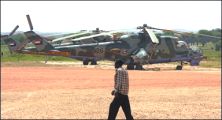Darfur rebels accuse Sudan govt of attacks during peace talks
ABUJA, Nigeria, Oct 29, 2004 (AP) — Sudan ‘s rebels accused the government of launching fresh air raids on areas of Darfur under its control on Friday, and warned that already slow-moving peace talks could suffer as a result.

|
|
Two Sudanese military helicopters at El-Geneina airport. |
The two Sudanese rebel groups — the Sudan Liberation Army and the Justice and Equality Movement — said Sudanese government forces launched bombing raids in and around the towns of Al-Mahla on Friday and Haskanit on Thursday. Both towns are in the Sudanese state of North Darfur, and rebel bases lie in the areas.
“If things continue like this, there is no way we are going to stay in Abuja to talk about peace,” said Sudan Liberation Army spokesman Mahgoub Hussain, threatening to counterattack government and Janjaweed forces.
Officials with the African Union-backed Cease-fire Commission, in Sudan and Nigeria, said they had no knowledge of the attacks.
Majzoub Khalifa, the head of the Sudanese government delegation at the talks in the Nigerian capital Abuja, referred questions on the alleged attacks to the cease-fire commission.
The United Nations has called Darfur the world’s worst humanitarian crisis and said it has claimed 70,000 lives since March — mostly through disease and hunger — while 1.5 million have fled their homes since February 2003. No reliable figures are available for those killed by violence.
The Sudanese government has said the U.N.’s death toll is hugely exaggerated, putting the toll at around 7,000.
After days of stalling, the government and the two rebel groups held a session together at the International Conference Center in the Nigerian capital Abuja. Each side gave separate presentations outlining long-term political solutions to the conflict, but they didn’t interact.
The government proposing devolving more power to Darfur’s three states and the Sudan Liberation Army calling for a separation of religion and state.
Neither the government nor the Islamist Justice and Equality Movement referred to the role of religion in their proposals.
The first face-to-face talks on the crisis in this round of talks were expected later Friday.
Outside of the conference center, in Abuja’s luxury Meridian Hotel, African Union mediators sat with government and rebel delegates to try to draft an agreement on security which would satisfy all the parties. Direct discussions between the two sides were to be held later in the day.
Hussain said discussions on a security agreement were “still at square one.”
The Sudan Liberation Army, the larger of the two rebel groups, is pushing for all government troops in Darfur to be garrisoned in its three regional capitals, for a no-fly-zone to be declared over Darfur, and for more peacekeepers beyond the 3,320 set to arrive there by the end of November.
The current draft security accord does not address any of these issues, he said.
The Sudanese government is pushing for an accord which would oblige the rebel groups to disarm, and which would omit the word Janjaweed, referring rather to “armed militias” and “armed groups.”
Rebels refuse to disarm, and argue that the rephrasing of the text proposed by Sudan could be taken to mean that all rebels should be disarmed also — something they are not willing to consider.
An earlier round of Nigeria-hosted peace talks broke down after over three weeks in September, when rebels refused to sign a “humanitarian protocol” allowing aid organizations unfettered access to hundreds of thousands of refugees from Darfur’s violence.
The accord, they said, would be impossible to implement without an accompanying security agreement.
On Thursday, 47 Nigerian troops left Abuja for Darfur aboard a U.S. Air Force transport plane, the latest batch of soldiers being deployed to bolster an African Union peacekeeping force there.
Nigeria already has 155 troops in Darfur, and is expected to send several hundred more. The African Union force currently numbers 390 and is supposed to expand to 3,320 soldiers by the end of November.
